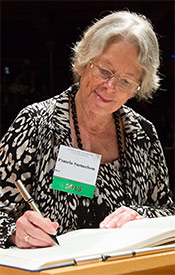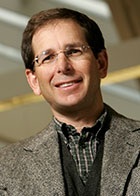
By Leslie A. Gordon
Today, virtually everyone online interacts with copyrighted works in the form of downloaded and file-shared photos, music, movies, and books. Technology has also brought new stakeholders into the copyright arena, as user-generated content has allowed ordinary people to publish and distribute original material. Yet the prevailing law is outdated: The US Copyright Act of 1976 was originally drafted in the 1960’s based on studies conducted in the 1950’s.
Conceived decades before widespread use of broadcasting, let alone the Internet and global digital networks, the Copyright Act is also widely considered too long, too complicated, and too difficult to understand.
“The Copyright Act is not exactly up to snuff for the Internet age,” said Professor Pamela Samuelson, co-director of the law school’s Berkeley Center for Law & Technology (BCLT) and a pioneer in digital copyright law. “It contains a number of ambiguities that have led to litigation because of new technologies that Congress didn’t contemplate.”
Indeed, in a lecture at Columbia Law School last year, Maria Pallante, the Register of the U.S. Copyright Office, acknowledged that copyright law had become “progressively unreadable” and that a comprehensive overhaul—what she nicknamed “the next great copyright act”—is in the public’s best interest. Beyond “minor adjustments” or “technical corrections,” the revision should be “forward thinking, but flexible” and address “larger policy themes” such as exclusive rights, incidental copies, and enforcement.
Pallante’s sentiment has since been echoed by Congressman Bob Goodlatte (R-VA), chair of the House Judiciary Committee’s Subcommittee on Courts, Intellectual Property and the Internet, which has held a series of meetings on copyright issues. Similarly, the Department of Commerce, through its Internet Policy Task Force; the Patent and Trademark Office (PTO); and the National Telecommunications and Information Administration; published a Green Paper on Copyright Policy, Creativity, and Innovation in the Digital Economy last summer. The paper examined how copyright can be meaningfully enforced online.
“Since I’ve been in the field, this is the broadest conversation about revising the Copyright Act that has taken place,” said Samuelson, who spearheaded a three-year project on copyright reform, The Copyright Principles Project. A final project report recommended overhauls such as the establishment of consistent statutory guidelines for damage awards, modernization of the copyright office, and a refining of exclusive rights.
A better framework
To further contribute to the national conversation about updating copyright laws, Berkeley Law is hosting The Next Great Copyright Act, a comprehensive conference whose title refers to Pallante’s bold declaration. On April 3 and 4 at the Claremont Hotel in Berkeley, as many as 200 scholars, policymakers, and copyright stakeholders will explore how the current copyright law can be made more understandable and provide a better framework for adapting to the challenges posed by emergent technologies.

Conference speakers will include Lawrence Lessig of Harvard Law School; Judge M. Margaret McKeown of the U.S. Court of Appeals for the Ninth Circuit; Robert J. Kasunic, associate register of copyrights and director of registration policy and practices at the U.S. Copyright Office; and executives from Google, Comcast, and Microsoft.
“We’ve put together a good mixture of people from various copyright sectors,” Samuelson said. “We’ve planned a very broad agenda that will cover the entire waterfront.” Session topics will include exclusive rights and infringement, secondary liability and safe harbors, music industry-specific reforms, quasi-copyright reforms; and others that affect schools, libraries, archives and museums.
“By any measure, we’re pretty long past a revision; the Copyright Act has many creaky aspects,” noted Professor Peter Menell, co-founder of BCLT who will serve on a conference panel about remedies and enforcement. While the Digital Millennium Copyright Act of 1998, which provided certain limitations on the liability of online service providers for copyright infringement, was a “substantial update,” it only addressed a slim aspect of copyright issues, added Menell. The law professor worked on the PTO’s Green Paper as an Edison Scholar.
At the copyright conference, academics “can expose policymakers to research and thinking on these issues,” which should help as revisions are considered, Menell added. “With a range of prominent scholars with different perspectives, we’re the best known academic institution in Intellectual Property. Plus, the Bay Area is very important place for copyright. The companies here are major players. As a result, this conference will garner attention.”